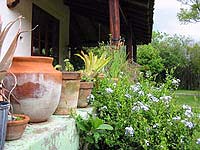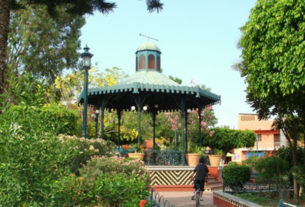 After nine years in Jalisco, my infatuation with the Mexico that visitors experience had long since become the Mexico where I worked for a living-where I filed taxes, met deadlines and had the oil changed in my car. I’d come to Mexico for a thirty-day visit in 1994 and stayed when a well-paying position, tailor-made for my skills and interests, surfaced. I hadn’t thought about living in Mexico before I came and after nine years I couldn’t think about leaving.
After nine years in Jalisco, my infatuation with the Mexico that visitors experience had long since become the Mexico where I worked for a living-where I filed taxes, met deadlines and had the oil changed in my car. I’d come to Mexico for a thirty-day visit in 1994 and stayed when a well-paying position, tailor-made for my skills and interests, surfaced. I hadn’t thought about living in Mexico before I came and after nine years I couldn’t think about leaving.
In my seventh year I accepted the invitation to share the home of one of the first people I’d met, Isabel Fuente. When I met her, she was designing and manufacturing a line of cotton clothing from a shop just a few doors from the Nueva Posada Hotel in Ajijic. Every few weeks she made the 90-minute drive to Rio Caliente Spa in Guadalajara, where I worked, to sell her clothing to guests. After a year or so of polite inquiries and patio chats, she invited me to her home in Ajijic. But by the time I was able to accept her invitation, it was a weekend she planned to be away. “Come anyway,” she’d said, “make yourself at home.” I did.
That was the beginning of a friendship that morphed at times into business and social relationships. Her mastery of English allowed our friendship to live and flourish in a way that could not have happened if the task of a mutual language had fallen to me. We shared friends, worked on projects together, and sometimes relaxed our reserve enough to reveal our interior lives. I admired her original intelligence, her sense of humor, her insights, her education, and her quick and delightful presence. As the years passed, I learned to depend on her friendship.
That same year my older sister died suddenly at 47. A month before, I’d been diagnosed with a rare disease that dried out my eyes, desiccated my skin and left me so tired that I needed long hours of rest and pills to control the aches in my bones. Always able to summon up energy and enthusiasm for my work and personal adventures, my transition to a person stunned by grief and facing chronic ailments sent the needle of my inner compass spinning. I was being forced that year to let go of an old self and find that first step to a deeper knowledge of myself.
Like many significant events, the conversation with Isabel about living in the part of her house once occupied by her daughter had unlikely beginnings. Casually proposed over lunch one day, we soon agreed on my portion of the expenses, the moving date, hatched plans to manage our pets, and eventually found ourselves living under the same roof.
On the very first day we began a morning ritual of coffee and bread. Dark, acidic coffee from Colima was brewed and bread was toasted in the small oven mounted on the wall in the working part of her kitchen. In the dining part of it, we sat at a table framed on three sides by windows that gave views into her garden. Through these windows, we witnessed the arrival of the day. Birds hopped in the trees and sang, air blew across the fragrant woodwork, orchids, grafted to the trees, postured and bloomed, and a passion fruit vine, called in Spanish, la maracuyá, wound its way across the garden’s massive rubber tree. It was in this house, that I began the journey from the outside orbit of the foreigner into the embrace of another Mexico.
“In the jungle, the garden likes to live in the house with us,” said Isabel, as we crossed the terrace one morning to check on the orchids and monitor the progress of the garden and its inhabitants. “He is like a creature we’re always trying to keep in his cage. We feed him and give him water, but if we don’t pay attention, he is in our beds!”
I laughed, imagining the garden as a wily “he”, instead of a pampered “she”, an image derived from my stubborn gardens in Texas that simpered and faltered and had to be coaxed along.
“Just look how the ants have been making new roads. In one month they have made three new places. Imagine!”
The week before, I’d stuffed cotton soaked with sugar water and boric acid into the biggest of the anthills, hoping worker ants would carry the solution to the queen.
“I think we can close the openings between the steps to divert them at least,” she mused.
Next, we inspected the wire netting she’d twisted into cones around the trunks of the palms that grew along one side of the kitchen.
“What are these for?”
“Rats.”
“What does the netting do?”
“It stops them from walking up to the roof, but it doesn’t work.”
In the mornings, we’d find twigs, droppings and other debris that had fallen from the terrace’s roof onto the floor of the patio. The rats had built a nest between the clay tiles, chewing holes in the woven petate liner between the roof struts and the tiles. Every morning she inspected their damage and fumed a little, working her mind to think of another way to drive them out.
“One day I will discover how they are walking to the roof,” she declared, and left for the west side of the house to check again for branches leading upwards.
I sat down at the table on the terrace and looked at my calendar.
“What time are you going to the airport”, I shouted.
“Eleven thirty,” I heard her yell from behind a giant philodendron that grew at the northwest corner of the house. More than a storey high, the massive plant had trunks six inches thick with leaves bigger than serving trays.
“Is that what time we’re supposed to leave?”
“Eleven thirty,” she shouted again, this time with some impatience. It was not uncommon for us to miscommunicate, fumble important cues, and end up looking blankly at one another for a beat or two.
Occasionally we labored with earnest explanations but for the most part, we did the equivalent of a mental shrug and moved on.
Within the next 12 hours, Isabel would be landing in northern Spain. She was embarking on an extended journey to visit her father’s relatives in Aviles, Asturias. There were cousins to visit and the family home to see. She’d been there years ago as a teenager when her father was still alive but remembered very little of the trip. The cost of the ticket had been steep and the weather cold and damp this time of year, but when asked why she was going, she always said, “My father’s story is a mystery to me. I think I should go.”
Later that afternoon after the trip to the airport and hours of work in my office I lay in the hammock while three of the five dogs that patrolled the garden nuzzled my hands. It had been a long time since I’d spent money to visit family. Friends yes, but family no. In my counseled and analyzed generation, the mention of “family” brought groans and litanies of infractions. Blood runs deeper, I thought, with some people more than with others. And sometimes blood just runs cold.
April and May were hot, so hot at this altitude of 5200 feet that everyone sought out the shade of their homes and gardens and waited with a kind of strained patience. It seemed like everyone with land burned off the brush, making the air hotter and charring the landscape black. The Aztecs had done it, I read, believing that sending smoke into the sky encouraged the Rain Gods to let go of the rain. Environmentalists ranted about the idiocy of “slashing and burning” and the hopeless pollution of the atmosphere. Tempers flared in the glaring heat and optimism for even the most minor excursions flagged. Beer and tequila flowed but rarely slaked anyone’s thirst. Baptisms and quinceañeras all had an edge to them as families went through the motions in the heat.
In May, I tried to dodge Isabel’s bad-tempered maid, Chuya, who was even more disagreeable than usual. I’d described her once to a friend who pictured her wearing a breastplate and horned helmet, a surprisingly apt caricature that I could never shake. She hated her work and hadn’t the good grace to keep it to herself. She bullied everyone, including her children, and begrudged us our lives because we earned money at our desks instead of by holding a broom. The poverty of her spirit was something we learned to ignore.
In the middle of the month her husband became ill with kidney problems and I began to loosen up about her temper. Week after week she asked me for money to pay his bus fare to a doctor in Guadalajara, an hour’s journey away. By the fifth week he was so sick his doctor admitted him to the hospital for dialysis. Several tense weeks passed before he could come home. On the Thursday following his return she asked me again for money. Her sister’s son, Miguel Angel, she told me, had been murdered in Los Angeles. The twenty-seven year old dishwasher had finished up his shift and walked right out into the middle of a gang war. He never felt the bullet. “Gracias a Dios”, she said. “He didn’t know anything, thank God”, she said again, and with a flash I knew he must have died hard. The story had been crafted for the mother, Chuya’s sister, who initiated the grim task of collecting enough pesos to bring his body home. When I clucked my compassion to Chuya she shrugged and said, ” Pues, es la vida.” (“Well, that’s life.”) She took the 500 pesos I gave her and turned away, not thanking me. Earning no more than $31 US dollars a week for half time work, people of her class had no savings. Collecting money for emergencies was undertaken by the women without shame.
May cranked on and I was worn out from the heat and from missing Isabel’s company. I drank my coffee in the mornings with little satisfaction and avoided Chuya who scowled and muttered and kicked at the dogs. On the third Saturday of the month I met a man for drinks at a sports bar just off the plaza. We sat down at an empty table and exchanged greetings and the usual complaints about the heat. He ordered vodka. I asked for a lemonade, not so much to be prim as to avoid the ache alcohol inspired in my joints. We were casual acquaintances, introduced by other casual acquaintances. No one knew exactly how many of us foreigners lived around the Lake but educated guesses put the number around 5,000. Depending on how active socially we were, we knew about half of them by sight. Gibbs had been in Mexico longer than many of us. At the 12-year mark he’d told friends he was leaving this “damn country” and I wanted to find out why. But after 10 minutes I regretted meeting him. He was a world-class talker who swilled drinks between tirades about contractors, officials, maids, lawyers, gardeners, shopkeepers, cops, other Americans, other Canadians, those fucking “Brits”, Texans and the local king of the dogpound. “I want to go back to a country that’s finished,” he croaked after an hour of ranting, drunk on alcohol and rage. Having heard enough I stood and announced my departure. A look of complete and utter surprise came over him as I took my leave.
“What’d I say? What’d I say,” he asked, plaintive as a child, as I made my way into the street.
Night had finally arrived and with it, blessedly cool air. I knew why the ancients threw major toots when the rains came. The relief crawled out from under your brain and made you go wild. I saw my car where I’d left it but kept walking. God, the nights are fabulous, I thought, and headed west into one of the first neighborhoods I’d known in Ajijic.
About nine blocks later I saw the tree that marked ‘six corners’, a noisy neighborhood where pork skins were fried in massive copper cauldrons on the sidewalk and locals hollered at one another to move their vehicles throughout the day. Traffic was hopeless at the “corners” as cars were allowed to circulate in both directions on the pinched lanes. At night hired fiesta halls boomed music, couples groped one another away from the streetlights, a ramshackle gym harbored troublemakers, and a few bitter looking men hung around on the side streets and drank. Peeved at the fellow in the bar, I looked for a doorway with a stoop and sat down. I had nothing else to do but go home and watch idiot television programs from my satellite dish. I left briefly to buy a canned soda and returned to sit in the doorway, protected a little by its deep recess, and waited to be distracted by someone else’s world.
It didn’t take long.
Two flower vendors, women in their fifties, walked by with empty buckets, chatting companionably in the cool air. A new Dodge Ram truck with huge rounded bumpers and four teenagers in the front boomed by, shaking the street with the noise from its speakers. Gang wannabes with hairnets pulled low over their foreheads and colossal pants hanging off their rumps strolled by practicing their tough faces and grunting parts of slogans to one another. A woman in her thirties ushered her brood of five children home after some errand that must have involved all of them. By now the moon, nearly full, lighted the sky overhead.
The couples groping one another moved further into the shadows, out of the views of passersby. Two men in the distance were swaying and laughing, sappy on tequila, and stopping now and then to cry, urinate, and pound each other’s backs. I counted two bathroom stops apiece for each man and noticed that one man moved with a particularly exaggerated swagger. Within 30 minutes from the moment I first saw them, they’d advanced far enough to embrace the giant tree that marked the neighborhood. I leaned forward and thought I recognized my friend Carmen’s husband, Rigoberto, the less drunk of the two. Now within earshot I could hear the drunker man singing. His boozy baritone mumbled the José Alfredo Jimenez cantina standard, “Ella.”
“I got tired of begging her.
I got tired of telling her.
That without her,
I’d die of sorrow.
She wouldn’t listen.
If her lips opened
they were to tell me,
“ya no te quiero.”
I don’t love you anymore.
Uh, oh, love on the rocks with salt and a twist of lime in the wound.
The crooner said something to Rigo who promptly punched him and sent him face down on the roots of the tree. Rigo rubbed his fist and then recovered after a fashion by passing wind loudly and staggering off. The other man turned over and managed to place one hand over the other to pull himself up the tree and into a standing position. As he twisted around something gave way at his knee. His shoe and part of one leg stood up inside his trousers for a moment and then fell away from the rest of him, skittering over the roots of the tree and into the gutter. Even I, fully sober, had trouble deciphering this event until the man wailed, ” ¿Ya no me quieres, tambien?” You don’t love me, either? And then he started laughing, the way heartbreak and tequila can make you laugh. Like a maniac.
And I laughed with him, long and hard and for a moment we shared an insane, improbable glee. Wobbly with laughter I left him there, knowing a relative would come at dawn to haul him home. The heat had finally broken and I was on my way home.


